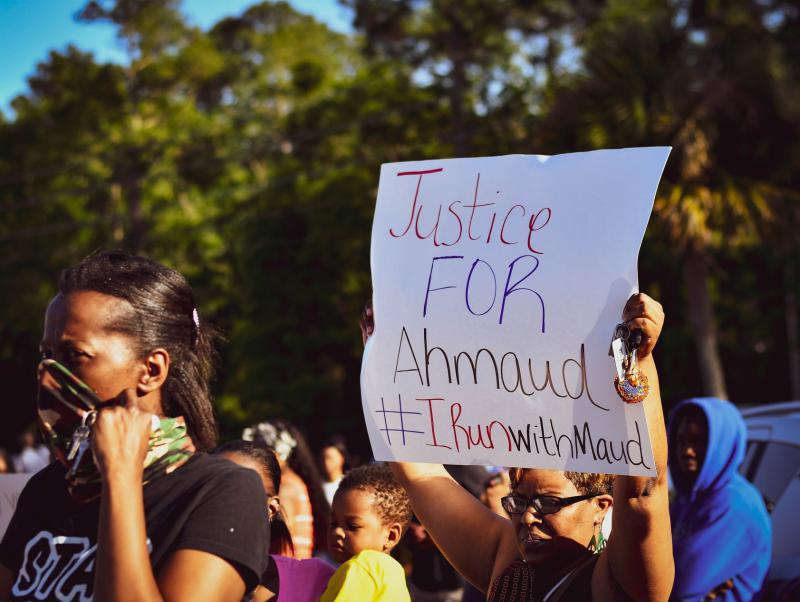Section Branding
Header Content
What Is Georgia's Citizens Arrest Law — And Why Are There Calls To Repeal It?
Primary Content
Gregory and Travis McMichael were arrested last week for the death of Ahmaud Arbery in February.
The McMichaels shot and killed Ahmaud Arbery while he was out jogging on Feb. 23 in a neighborhood near Brunswick. The McMichaels told police at the time that Arbery matched the description of someone caught on a security camera committing recent break-ins in the neighborhood.GPB's Rickey Bevington speaks with GPB reporter Sarah Rose on Georgia's citizens arrest law.
The case has had four different district attorneys. The second to recuse himself, George Barnhill, said in a letter at the time that he believed the defendants were within their rights in performing a citizen’s arrest.
But critics have said the defendants, and Barnhill, are wrong in that assertion.
GPB reporter Sarah Rose spoke with All Things Considered host Rickey Bevington to explain Georgia's citizens arrest laws.
This conversation has been edited for clarity and conciseness.
Rickey Bevington: Under Georgia law, what would constitute a citizen’s arrest?
Sarah Rose: Georgia’s citizen’s arrest law states that a private citizen can detain someone if they have reasonable and probable grounds of suspicion. Georgia has had this law on the books since 1863; most other states have similar laws as well.
But — that private citizen has to have witnessed someone committing a crime, or they have to have what the law calls “immediate knowledge” that a crime has been committed.
The Georgia Supreme Court has also ruled in several cases in the past about the use of force in a citizen’s arrest.
In a 2004 case, a convenience store owner shot an intruder who broke into the store after the store owner told him to halt. He then claimed he was performing a citizen's arrest. The supreme court said the measure of force used was disproportionate to the circumstance.
In another case, in 2017, a man chased someone whom he thought had burglarized his home. The homeowner attacked the man with a baseball bat. The court also found in that case that unnecessary force was used and it was not a legitimate citizen's arrest.
Bevington: Georgia District Attorney George Barnhill recused himself from the case, but not before writing a letter saying he believed the McMichaels had done nothing wrong.
Rose: Gregory McMichael worked in the Brunswick district attorney, Jackie Johnson’s office. So, she was the first DA to recuse herself. The GBI has said now that Barnhill then also recused himself because McMichael had worked with his son on a previous case involving Arbery.
In the letter Barnhill wrote, he said he believed they were trying to hold a suspect until the police arrived.
He also said the shooting of Arbery was in self-defense. Georgia's "stand your ground" law, passed in 2006, says a person using force in self-defense has "no duty to retreat and has the right to stand his or her ground."
The National District Attorneys Association has since criticized Barnhill’s decision to write the letter, saying that the move has potentially damaged the ability to prosecute the case.
PREVIOUS COVERAGE: Breaking Down Georgia's Citizen's Arrest Law After Ahmaud Arbery Fatal Shooting
Bevington: I understand that the Arbery’s mother’s attorney, L. Chris Stewart, has also called the citizen’s arrest defense into question.
Rose: Arbery’s mother’s attorney, L. Chris Stewart, told me that he believed the actions of the McMichaels do not constitute a legitimate citizen’s arrest.
"You see a black man shopping down the street and assume he's a criminal?" Stewart said. "Go get your guns and hunt him down? Yes. It's insanity to even attempt to try and call that citizen's arrest."
Because the McMichaels did not witness Arbery committing a crime, Stewart believes that they did not have proper cause to attempt to detain him.
Stewart argued that a good example of the proper use of the law would be if someone witnessed someone robbing a grocery store, tackled them, and waited for the police to arrive. This situation is not that.
Bevington: And now some Georgia lawmakers are calling for the citizen’s arrest law to be repealed.
Rose: A group of more than a dozen Georgia lawmakers traveled to Brunswick on Tuesday and demanded that the citizens arrest law in the state be repealed.
Of note here is that Georgia is one of four states that does not have a hate crime law. There was an existing 2019 effort in the state legislature to create one, but it stalled in the senate. Following Arbery’s death, some lawmakers want to finally pass the bill and rename it after Arbery.
Rep. James Beverly wants to take it a step further and amend the bill to repeal the citizen's arrest law in Georgia, saying that it’s the only way to prevent a crime like this from happening again.


